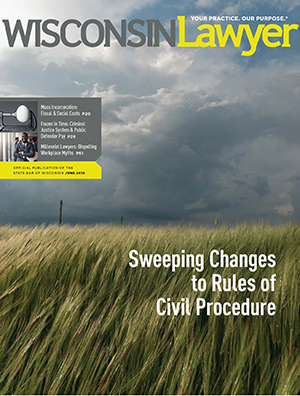 June 12, 2018 – The Wisconsin Legislature recently made sweeping and significant changes to the rules of civil procedure. If you’re a civil litigator, these changes will affect your practice. Wonder how Wisconsin’s “lock ‘em up” approach to criminal justice affects the state budget and thus your taxes? Concerned that low compensation for private-bar lawyers appointed to represent indigent criminal defendants acts as a barrier to access to justice?
June 12, 2018 – The Wisconsin Legislature recently made sweeping and significant changes to the rules of civil procedure. If you’re a civil litigator, these changes will affect your practice. Wonder how Wisconsin’s “lock ‘em up” approach to criminal justice affects the state budget and thus your taxes? Concerned that low compensation for private-bar lawyers appointed to represent indigent criminal defendants acts as a barrier to access to justice?
Changes to the Rules of Civil Procedure
2017 Wis. Act 235, enacted on April 3, 2018, is notable not only for its amendments to the rules governing civil litigation practice but also for its divergence from the usual process for enacting such changes. The Act, prepared without the input usually provided by the Wisconsin Supreme Court and Judicial Council for laws affecting civil procedure, makes substantial changes about which all civil litigators must be aware.
In “Sweeping Changes to Rules of Civil Procedure,” Ryan Billings, Robert Gegios, and Melinda Bialzik discuss the most significant changes, including restrictions on the scope of discovery, reductions of statutory limitations or repose periods for several causes of action, third-party litigation funding requirements, and interest rate reductions on overdue insurance payments, among other changes. The authors expect that litigants and courts will face a myriad of uncertainties and challenges as they litigate under the new rules.
Owning the Problem: The Costs of Mass Incarceration
Wisconsin incarcerates non-white persons at far higher rates than whites and at rates of disparity far above the national average. This mass incarceration brings with it massive costs, in both dollars and harder-to-measure social effects. In “Mass Incarceration: Fiscal & Social Costs,” Michael O’Hear summarizes the financial costs of mass incarceration and compares Wisconsin’s prison costs and incarceration rates to those of nearby states. He then explains the social costs: to the imprisoned individuals, to their families, and to their communities.
This article is Part 2 in the “Owning the Problem” series by the State Bar’s Mass & Disparate Incarceration Committee as part of an equal justice initiative to bring stakeholders in the criminal justice system together to address mass and disparate incarceration.
Does Public Defender Pay Affect Access to Justice?
By all reasonable measures, Wisconsin’s compensation for private-bar lawyers appointed to represent indigent criminal defendants is woefully inadequate – whether appointed by the SPD’s Office or by the circuit courts. In “Frozen in Time: Criminal Justice System & Public Defender Pay,” Thomas Walsh, a Wisconsin circuit court judge, discusses the role of publicly appointed criminal-defense lawyers and analyzes problems in the current appointment system, using results from the State Bar’s most recent economics of practice survey .
Other Columns
Solutions: Lawyers often avoid difficult conversations when the topic is their own or a colleague’s career. In “We Need to Talk: Preparing Senior Lawyers for Retirement,” Ida Abbott offers tips for having the talk about retirement.
Career: In “Dispelling Workplace Myths About Millennial Lawyers,” Megan Heneke says lawyers from the millennial generation are less “different” than their older colleagues might think, but the changes they do bring to the profession are positive.
On Balance: In “4 Ways to Conquer Self-doubt,” Paula Davis-Laack provides tips to help develop self-efficacy – the type of confidence that helps you achieve.
Managing Risk: You can reduce the chances of having to spend your legal malpractice insurance deductible. In “Top 10 Ways to Avoid a Malpractice Claim,” Tom Watson shows you how.
Technology: In “Managing Your Digital Files,” Christopher Shattuck says in addition to preserving physical messages and notes, lawyers should consider storing the metadata contained in electronic documents.
Ethics: Dean Dietrich, in “Can Discovery Put Clients at Cross-purposes?” warns taking an existing client’s deposition for another client’s matter should be conducted with great care, if at all.
Final Thought: Cynthia Herber believes one of the best ways to be a better lawyer is to step into your clients’ shoes and view the world through their eyes. She explains in “Now Imagine….”
Check out the
June
Wisconsin Lawyer.
